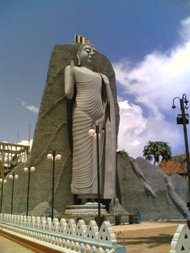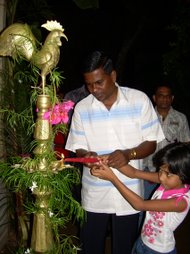A life as it was
October - the month to remember The Mahatma
Menika - The Friday's News
It was that other great Indian, Rabindranath Tagore, who coined the honorific title, ‘Mahatma’ to preface Mohandas Gandhi’s name, which meant ‘great soul’. This was around 1915, soon after Gandhi returned to India from South Africa after inaugurating his satyagraha method to right injustices meted out to coloured peoples, particularly Indians. Coincidentally, both Gandhi and Tagore, along with other Indians of the organised National Congress, returned the honours bequeathed upon them by the British government. Gandhi was awarded the Kaiser-i-Hind (Emperor of India) medal for services to the British Empire. This he returned to the British government. Nobel Laureate and national poet Tagore resigned his British knighthood soon after Brig. Gen Reginald Dyer’s mass murder of Indians in the Jallianwala Bagh, Amritsar, on April 13, 1919, when they gathered peacefully to celebrate a Sikh festival.
Loads have been written about Mohandas Karamchand Gandhi, mostly in deep reverence of this saint. He himself wrote his autobiography: Gandhi: an autobiography: the story of my experiments with truth. October, as I said, sends our minds anew to remember him since he was born on October 2, 1869.
Latterly writers have written about his quirks, which certainly he had. He has been elevated to sainthood, and justifiably. He is by all counts the greatest man of the 20th century, beating by lengths the other person voted to this position by the western world, namely Winston Churchill.
We could also justifiably say he is the second or third greatest Indian of all time, coming third to Siddhartha Gotama, the Buddha, and Emperor Asoka the Great.
But idiosyncrasies the Mahatma did have.
I’ve been reading Alex von Tunzelmann’s Indian Summer: the secret history of the end of empire. The word ‘secret’ immediately connotes expectations of hidden facts, OK gossip, mostly human idiosyncrasies being revealed, and they are, like the very close relationship enjoyed by Nehru and Edwina Mountbatten. And so are revealed some of the quirks of the Great Mahatma himself, which to me definitely do not diminish his stature, but enhance it by showing he was a human being with human foibles who reached beyond and above them in his attempt to take himself and others closer to God (the Hindu god in this case, but Gandhi did revere all religions) and to almost kill himself through starving to attain peace between warring Hindus and Moslems and to gain independence for India from British rule.
Idiosyncrasy one
Gandhi swore to the vow of celibacy in 1906, where brahmacharya meant control not only of the sexual urge but of the senses in thought, word and deed. Now I personally have to quarrel with his making others take the vow. He almost forced it on Kasturba, his wife, but that was not too difficult for her since she was his faithful wife and followed him in everyway in true Indian style. But he promoted, even enforced brahmacharya in his ashram in Gujerat where he: “broke up several marriages by persuading woman to renounce sex.”
He was getting more and more distant from his sons. I quote from Tunzelmann’s book. “By the middle of the 1920s, his relationship with them had become extremely difficult. When 18-year-old Manilal was caught in an embrace with a young, married Indian woman, Mohandas coerced her into shaving her head and extracted from Manilal a vow of lifelong chastity. In 1926, still languishing under his vow, Manilal fell in love with a Muslim woman called Fatima. Mohandas was outraged. “Your desire is against your religion” he wrote to Manilal. The son did not marry Fatima. Even when the youngest son Devadas fell in love with Chakravarty Rajagopalachari’s daughter, the couples were asked to delay marriage for five years, which they did and then wed.
Gandhi considered birth control a sin since it “allowed a person to indulge his animal passion and escape the consequences of his act.” Nehru was totally opposed to this idea, and Gandhi’s advocating total abstinence from sex.
Idiosyncrasy two
Gandhi’s aversion to medicine, especially western medicine, was another idea that we do not subscribe to now, in that he could follow it but it was not justified in forcing the idea on others.
While Gandhi was in prison, in December 1943, Kasturba fell ill with bronchitis which soon deteriorated to pneumonia. Doctors advised Gandhi to stay away from his wife, but he believed not in germ theory so took it upon himself to nurse the ailing woman. Penicillin was prescribed but Gandhi did not administer it to her, rather did he want her to pray for her recovery. Son Devadas had penicillin flown in from Calcutta but though he fought with his father to have the medicine injected, the father remained adamant. Instead he surrounded the dying woman with his followers who sang devotional songs. Kasturbai pleaded for castor oil to relieve her; he refused it.
“A patient should never try to be his or her own doctor. I would like you to give up medicine now.”
Harilal, another son, arrived drunk and so was not allowed to see his mother, though she “sobbed and beat her forehead with her hands.” She died the next day and Mohandas was devastated. Sushila Nayyar visited the sorrowing man that night. “How God has tested my faith,” he said. “If I had allowed you to give her penicillin, it could not have saved her. But it would have meant bankruptcy of faith on my part... And she passed away in my lap. Could it be better? I am happy beyond measure.” After his sons disposed of the ashes, Gandhi cried.
Idiosyncrasy three
Much is written now about Gandhi’s later habit of sleeping with a nude or half nude young girl in his room, testing his strength to keep his vow of chastity and his emotions free of desire. An example is Gandhi’s grandniece, Abha, sleeping next to him when she was sixteen and he 74.
There were many other quirks which people still do not understand.
Churchill’s condemnations
We are familiar with the truly abominable comment Churchill made on seeing a picture of Gandhi visiting the Viceroy in Delhi. His comment to Irvin: “a seditious Middle Temple lawyer, now posing as a fakir of a type well-known in the East, is striding half -naked up the steps of the Viceregal Palace.” Irvin ignored him and later when asked whether Gandhi had been very tiresome, Irwin replied: “Some people found Our Lord very tiresome.”
On Gandhi’s fasts Churchill commented: “I do not think Gandhi has the slightest intention of dying. And I imagine he has been eating better meals than I have for the past week.” As the author of Indian Summer comments: “This was an overstatement. Even outside his fasts, Gandhi was not known to open a bottle of wine at breakfast.” (!). Churchill even had the audacity to think that Gandhi was taking glucose while on his fasts unto death and wanted this covertly investigated. Churchill also wrote to Viceroy Linlithgow: “I have long known Gandhi as the world’s most successful humbug. I am suggesting slyly to certain American correspondents here that it has not been so much a matter of having their heartstrings plucked as of their legs being pulled. What fools we should have been to bend before all his bluff and sob-stuff.”
But in spite of the controversy that surrounded the Mahatma and surrounds his memory even now, he was absolutely charismatic and he charmed people with his sincerity and humour. Nehru was closest to him and like a son; Kamala Nehru adored him as did Edwina Mountbatten, proof of which was the picture of Gandhi entering the viceregal palace during the first week of the Mountbatten couple’s arrival in India, with his arm on Edwina’s shoulder for support and companionship.
Feedback : editor.friday@lakehouse.lk





No comments:
Post a Comment